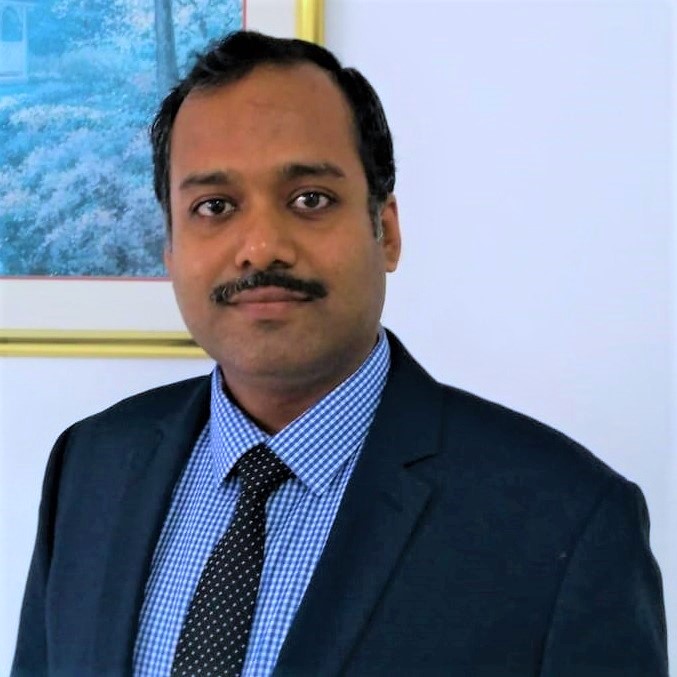Profile
Dr Debabrata Biswas is a microbial immunologist and pathogen biologist with special interest in bacterial skin pathologies, and in studying host-pathogen interactions from the perspective of the host responses. His lab is currently aimed towards developing principles to provide solutions, primarily, against Antimicrobial resistant bacterial pathogens, with a special focus on skin and nosocomial infections. Multipronged approaches are adapted to achieve the primary objective – 1) Host molecules targeted by bacterial virulence factors are investigated to elucidate targets for enhancement of host immune responses; 2) Extracts and compounds from natural resources are examined for their antibacterial, antibiofilm and immunomodulatory properties to provide scaffolds for the development of adjunct therapeutics; and 3) Bacterial toxins (like bacteriocins and cytolysins) are screened for their bactericidal capabilities to establish novel pathogen/disease scavenging modules. Targets and mechanisms, thus, elucidated will also provide indicators for drug repurposing against these smart pathogens.
Current Focus Areas
The group is studying Staphylococcus aureus, a prominent antibiotic-resistant skin pathogen, and Streptococcus pyogenes, known to cause significant autoimmune sequelae. We are actively looking into the patho-physiological interactions of bacterial virulence factors with host immune responses, using biochemical and functional studies based on cell culture and animal infection models.
We are screening solvent extracts from certain indigenous phytospecies of Odisha marine environment, for antibacterial and antibiofilm activity as well as any potential immunomodulatory properties. We have a few candidate samples that require detailed study as to their mechanism of action and the identity of their active components.
We are involved in the analysis of the recently collected marine water samples at ILS to isolate pure cultures of bacteria and do further characterization of the isolated bacteria.
Selected Publications
1. Anand A, Sharma A, Ravins M, Biswas D, Ambalavanan P, Lim XZK, Min RTY, Johri AK, Tirosh B, Hanski E. Unfolded protein response inhibitors cure group A streptococcal necrotizing fasciitis by modulating host asparagine. Science Translational Med. 2021, 13(605), eabd7465. [ISSN 1946-6234 (print), 1946-6242 (web); IF 17.99]
2. Biswas D, Ambalavanan P, Ravins M, Anand A, Sharma A, Lim XZK, Ming RTY, Lim HY, Bachrach G, Angeli V, Hanski E. LL-37-mediated activation of host receptors is critical for defense against Group A Streptococcal Infection. Cell Reports. 2021, 34(9), 108766. [ISSN 22111247; Scopus Metrics 6.264; IF 9.423]
3. Vajjala A, Biswas D, Tay WH, Hanski E, Kline KA. Streptolysin-induced endoplasmic reticulum stress promotes group A Streptococcal host-associated biofilm formation and necrotizing fasciitis. Cellular Microbiology. 2019, 21, e12956. [ISSN 14625814 (print), 14625822 (web); IF 3.715]
4. Jobichen C, Tan YC, Prabhakar MT, Nayak D, Biswas D, Pannu NS, Hanski E, Sivaraman J. Structure of ScpC, a virulence protease from Streptococcus pyogenes, reveals the functional domains and maturation mechanism. Biochemical Journal. 2018, 475(17), 2847-2860. [ISSN 0264-6021; IF 3.55]
5. Hertzog BB, Kaufman Y, Biswas D, Ravins M, Ambalavanan P, Wiener R, Angeli V, Chen SL, Hanski E. A Sub-population of Group A Streptococcus Elicits a Population-wide Production of Bacteriocins to Establish Dominance in the Host. Cell Host & Microbe. 2018, 23(3), 312- 323. [ISSN 19313128; IF 21.02]
